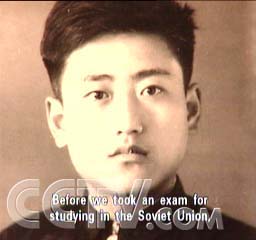 Xu Xiaozhong was once the President of China Central Drama Institute. Currently he is the honorary president of the institute. In 1955, 27-year-old Xu Xiaozhong was among the 1,495 students sent by the Chinese government to study in the Soviet Union. He learned the drama at the Lunacharsky State Drama Institute in Moscow for five years. He took an important step in his life. Many years later, Xu Xiaozhong was reputed as an artist epitomizing the drama of the new era because of his pioneering efforts on the stage. But Xu Xiaozhong himself sets greater store by his professional capacity of a drama educator. Xu Xiaozhong was once the President of China Central Drama Institute. Currently he is the honorary president of the institute. In 1955, 27-year-old Xu Xiaozhong was among the 1,495 students sent by the Chinese government to study in the Soviet Union. He learned the drama at the Lunacharsky State Drama Institute in Moscow for five years. He took an important step in his life. Many years later, Xu Xiaozhong was reputed as an artist epitomizing the drama of the new era because of his pioneering efforts on the stage. But Xu Xiaozhong himself sets greater store by his professional capacity of a drama educator.
One day in September 1955 at the Beijing Railway Station platform, a crowd of young men in Western-style suits and girls in button-through dresses boarded a train heading for Moscow. They were the fifth group of students sent by the Chinese government to study in the Soviet Union since 1951. Among them was Xu Xiaozhong, a young teacher of the Central Drama Institute.
Xu Xiaozhong participated in the examination in 1954 for candidates who wished to go to the Soviet Union. On August 9, 1952, the governments of China and the Soviet Union signed an agreement on Chinese citizens going to study in the Soviet Union. Under the agreement, the Soviet side paid each Chinese student a monthly subsidy of 500 roubles, while the Chinese government repaid 50 per cent of the Chinese students’ expenses twice a year. So it was said that the expenditure of each Chinese student in the Soviet Union could support a company of soldiers in China.
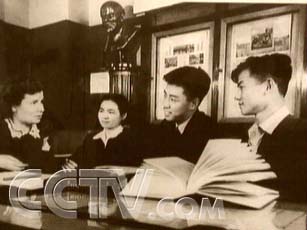 The Beijing School of Russian was established in 1949. Directly under the Central Translation Bureau, it was located in Weigongcun in the west suburbs of Beijing. Chairman Mao Zedong inscribed the name of the school.
The Beijing School of Russian was established in 1949. Directly under the Central Translation Bureau, it was located in Weigongcun in the west suburbs of Beijing. Chairman Mao Zedong inscribed the name of the school.
Xu Xiaozhong happened to see the peak period of students being sent to the Soviet Union. He was one of the more than 1,300 trainees at the Beijing School of Russian.
Xu Xiaozhong had the first contact with the drama from the records of Beijing opera collected by his father. Twenty years later when he left his homeland for a long journey, he was getting closer and closer to the drama he loved.
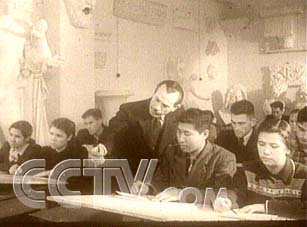 An old building stood at Albert Street in the downtown area of Moscow. This was Lunacharsky State Drama Institute where Xu Xiaozhong pursued his studies.
An old building stood at Albert Street in the downtown area of Moscow. This was Lunacharsky State Drama Institute where Xu Xiaozhong pursued his studies.
Every night in Moscow was a night of the drama. The city boasted more than 50 theatres of different sizes. A drama was staged at each theatre.
Xu Xiaozhong said that during his stay in Moscow, he was like a sponge put in the ocean of the drama. In fact, he began to take a passionate interest in the theatre when he was a high school student. On October 26, 1946, Xu Xiaozhong and some other schoolmates who loved the drama founded the Drama Troupe of the Federation of Student Unions in Wuhan.
On the roof of a schoolmate’s house, Xu Xiaozhong and his troupe members rehearsed “A House Full of Gold and Jade” by Shen Fu and other modern dramas. They gave public performances.
The names of some figures were familiar to students of the drama. Their photos were hung on the wall of the corridor in the Lunacharsky State Drama Institute.
The realist drama emphasized by Stanislavsky became one of the most important drama systems in the world. Meyerhold displayed aesthetics to seek the hypothesis of the drama. Vakhtangov pioneered a compatible approach between the two systems.
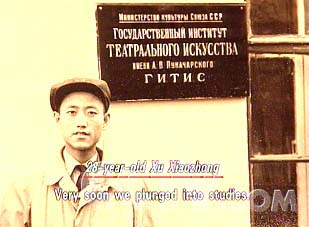 Zavaski acted Prince Calaf in the drama “Turandot” directed by Vakhtangov in 1922. He was a great star in the eyes of the Soviet people. He taught a class of students from various countries.
Zavaski acted Prince Calaf in the drama “Turandot” directed by Vakhtangov in 1922. He was a great star in the eyes of the Soviet people. He taught a class of students from various countries.
On October 25, 1957, activities were held in Moscow to mark the 40th anniversary of the October Revolution. Chairman Mao Zedong went to the Soviet Union to extend congratulations and attended a meeting of Communist and Workers’ Parties of various countries held in Moscow.
Xu Xiaozhong’s thoughts and sentiments perhaps also contained his longing for his sweetheart. Before he went to the Soviet Union as a student, Xu Xiaozhong got to know Huang Yilin, a student of the Department of Acting, Central Drama Institute. During the summer vacation of 1954, both of them took part in activities organized by the Youth League committee and the student union of the institute. They went to the Baiyangdian Lake to go into the midst of the local people.
After he expressed his love for the girl, Xu Xiaozhong took the train to study abroad. In the subsequent days, he had to transmit his longing through the international long-distance telephone calls.
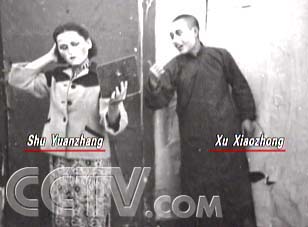 In 1958, Xu Xiaozhong got a rare chance to practise acting. The Gorky Film Studio of the Soviet Union needed a Chinese actor for the film “The Golden Train”.
In 1958, Xu Xiaozhong got a rare chance to practise acting. The Gorky Film Studio of the Soviet Union needed a Chinese actor for the film “The Golden Train”.
Forty-three years ago, a soul-stirring modern drama was staged at the Chinese Children’s Art Theatre in Beijing.
In 1959, the Ministry of Culture encouraged art troupes all over the country to stage dramas or operas as gifts for the 10th anniversary of the founding of New China. During the summer vacation of the year, Xu Xiaozhong returned to China with a script for rehearsal as a practice of acting. It was a modern drama adapted from “The Young Guard” by the Soviet writer Alexander Fadeyev. It happened that the Chinese Children’s Art Theatre was seeking a drama script to act as a gift for the National Day. The creation of the modern drama went on for more than three months.
In 1979, the Central Drama Institute resumed the enrollment of undergraduates. The freshers often saw on the campus a teacher of the department of directing dressed in a blue Chinese tunic suit. In those days, Xu Xiaozhong was a deputy dean of the department of directing.
Xu Xiaozhong rehearsed the play “Macbeth” as a practice of acting for the class of directing teachers enrolled in 1978 and the class of directors for advanced studies. This was the first play by Shakespeare performed on the stage in China after the “Cultural Revolution”. Xu Xiaozhong and his students spent five months mixing basic teaching with rehearsal of the play and experimenting on the hypothesis of the stage.
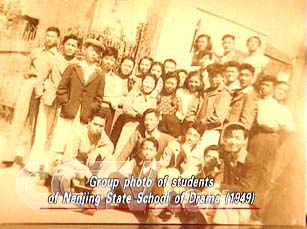 Xu Xiaozhong has been teaching at the Department of Directing, Central Drama Institute for 52 years. Originally he was at the Nanjing State School of Drama. After the school was merged into the Central Drama Institute in 1949, he studied at the general class of the institute for one year and then remained as a teacher. In 1955, he went to the Soviet Union as a student. In 1960, he finished his studies and returned to China.
Xu Xiaozhong has been teaching at the Department of Directing, Central Drama Institute for 52 years. Originally he was at the Nanjing State School of Drama. After the school was merged into the Central Drama Institute in 1949, he studied at the general class of the institute for one year and then remained as a teacher. In 1955, he went to the Soviet Union as a student. In 1960, he finished his studies and returned to China.
When the class of directing enrolled in 1979 was about to graduate, Xu Xiaozhong selected “Peer Gynt”, a famous play by Henrik Ibsen, as a drama staged for graduation. In the poetic drama “Peer Gynt”, Ibsen broke through the traditional idea of time and space in the drama and wrote a play in five acts and 38 scenes. Spanning dozens of years, the scenes included idyllic life, a den of mountain demons and a madhouse. Xu Xiaozhong made use of the revolving stage, dances as well as rapid changes of facial expressions in Sichuan opera to present Chinese features of the famous play by Ibsen.
In May 1987, students of the cadres class for advanced studies in the department of acting enrolled in 1986 rehearsed for graduation under Xu Xiaozhong’s direction in the small theatre of the Central Drama Institute.
“Anecdotes of Sangshuping” was a modern drama adapted by Xu Xiaozhong from a novel by Zhu Xiaoping. The compatible approach added a rich form and deep connotations to the play. The media called it an epitome of drama exploration in the first ten years of the new era in China. Xu Xiaozhong was in his peak period of teaching.
Xu Xiaozhong probably made a correct choice between being a director and being a teacher. During his work in the Central Drama Institute for 52 years, he witnessed the entire course of drama teaching in New China. Over the past 50 years and more, the Central Drama Institute has trained over 6,000 graduates. Especially since 1978, many graduates have become stars known to all.
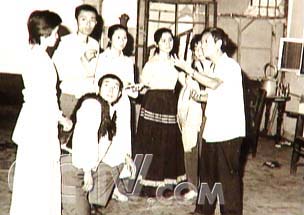 In 1991, Xu Xiaozhong admitted Wang Xiaoying as the first doctorate student of the drama in China. He had been a graduate enrolled in the department of directing in 1979 and had learned the drama from Xu Xiaozhong.
In 1991, Xu Xiaozhong admitted Wang Xiaoying as the first doctorate student of the drama in China. He had been a graduate enrolled in the department of directing in 1979 and had learned the drama from Xu Xiaozhong.
Xu Xiaozhong really found a chance for Wang Xiaoying to go to Russia on a tour of investigation. He was an unofficial member of the drama education delegation of the Central Drama Institute visiting Russia.
Before Wang Xiaoying investigated the drama in Russia, his classmate Zha Mingzhe had the chance to study for a degree at the Lunacharsky Drama Institute, Xu Xiaozhong’s Alma Mater.
On April 27, 2002, “It Is Quiet Here at Dawn” was staged in Beijing. It was a modern drama featuring the Great Patriotic War in the Soviet Union. When the play began, we saw the revolving stage that Xu Xiaozhong was expert in.
|